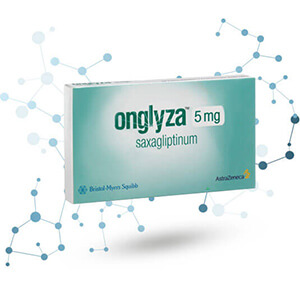Onglyza Lawsuit Overview
 For type 2 diabetes patients, no “magic bullet” exists to regulate blood sugar. Along with diet and exercise, prescription drugs can help lower blood glucose levels. DPP-4 inhibitors like Onglyza® provide one effective treatment option, but include additional health risks. In 2008, the Food and Drug Administration strongly recommended all new diabetic therapies undergo premarket cardiovascular risk assessments before approval. Yet the agency approved AstraZeneca’s first DPP-4 inhibitor, Onglyza (saxagliptin), in July 2009 without conducting any premarket cardiovascular risk tests. (This is due to the company filing for approval before the FDA issued that recommendation.) Then in 2013, two large clinical studies discovered 35 in 1,000 Onglyza patients required hospitalization for heart failure. The FDA issued a 2016 drug safety communication about this risk and also updated Ongylza’s warning label. Today, any type 2 diabetic diagnosed with heart failure may wish to file an Onglyza lawsuit against AstraZeneca.
For type 2 diabetes patients, no “magic bullet” exists to regulate blood sugar. Along with diet and exercise, prescription drugs can help lower blood glucose levels. DPP-4 inhibitors like Onglyza® provide one effective treatment option, but include additional health risks. In 2008, the Food and Drug Administration strongly recommended all new diabetic therapies undergo premarket cardiovascular risk assessments before approval. Yet the agency approved AstraZeneca’s first DPP-4 inhibitor, Onglyza (saxagliptin), in July 2009 without conducting any premarket cardiovascular risk tests. (This is due to the company filing for approval before the FDA issued that recommendation.) Then in 2013, two large clinical studies discovered 35 in 1,000 Onglyza patients required hospitalization for heart failure. The FDA issued a 2016 drug safety communication about this risk and also updated Ongylza’s warning label. Today, any type 2 diabetic diagnosed with heart failure may wish to file an Onglyza lawsuit against AstraZeneca.
What Is Onglyza?
Onglyza (generic name: saxagliptin) is a DPP-4 inhibitor drug used to lower blood sugar levels in type 2 diabetes patients. Diabetics have higher blood sugar than non-diabetics because their bodies respond differently to the foods they eat. Some people produce too little insulin after they eat, which reduces blood sugar levels during digestion. Others have blood glucose reabsorption issues, or their organs don’t get the same signals to release insulin when food arrives. Consistently high blood sugar can cause many different health issues over time, including amputations, stroke, heart attacks, and even death. Here’s what happens when a type 2 diabetic eats food after taking Onglyza:
- The body produces hormones called incretins, but not enough to trigger insulin release in the pancreas. (Insulin lowers blood sugar back to normal levels after ingesting food.) Normally, these incretins are active for a very short time only before they’re removed by the DPP-4 enzyme. Since Onglyza suppresses that hormone, the few incretins present in a diabetic’s body stay active for much longer.
- The diabetic’s pancreas eventually notices these incretins, which signals insulin secretion to handle the excess blood sugar. The diabetic’s body doesn’t start removing those incretins until after insulin starts doing its job.
- Plus, incretins staying around longer tell the diabetic’s liver not to release more sugar into the bloodstream just yet. Onglyza improves insulin sensitivity as well as prevents excess sugar production in the liver, which keeps glucose levels steady.
Unfortunately, Onglyza’s benefits may not outweigh the potential risks involved based on recent clinical trial outcomes.
Woman Files First Onglyza Lawsuit After Mother’s Heart Failure Death
Rochelle Gibson filed the first Onglyza lawsuit in October 2015 on her deceased mother’s behalf. The plaintiff’s mother, Lillie Ree Gibson, took Onglyza from 2010 until her death in October 2013. Gibson was initially diagnosed with heart failure in June 2011 and hospitalized twice in 2013 for the same condition. Doctors determined saxagliptin contributed to Gibson’s death. Aftewards, Ms. Gibson filed her mother’s wrongful death Onglyza lawsuit in Cook County Circuit Court. Now, the family seeks compensation to pay medical bills incurred by Gibson’s prolonged illness as well as her burial costs.
Plaintiffs Make Nearly Identical Onglyza Lawsuit Allegations Against AstraZeneca
In February 2017, Texas resident Wrendell Chester filed another heart failure Onglyza lawsuit. Chester allegedly developed severe complications after taking Onglyza from 2010 to 2015, including acute hypoxic respiratory and congestive heart failure. The plaintiff’s lawyer says nobody warned his client about any potentially life-threatening side effects before taking the drug. Chester’s Onglyza lawsuit says AstraZeneca’s marketing downplayed the drug’s risks and overstated its benefits.
And in May 2017, 14 New Jersey plaintiffs with near-identical Onglyza lawsuit claims consolidated their litigation efforts against AstraZeneca. Initially, some San Francisco plaintiffs filed suit in September 2016. Now, New York’s Napoli Shkolnik law firm represents all 14 Onglyza lawsuit cases filed in the New Jersey district court. In several Onglyza lawsuit cases, attorneys seek real as well as punitive damages against AstraZeneca for downplaying the drug’s risks. Since AstraZeneca widely marketed Onglyza for safely lowering blood sugar without causing weight gain, patients eagerly took it. Essentially, these plaintiffs want other type 2 diabetics to avoid Onglyza’s potentially life-threatening side effect risks.
Check eligibility for compensation.
If you or a loved one developed heart damage, pancreatitis or pancreatic cancer while taking Onglyza, you may be entitled to compensation from the manufacturer. Request your free case evaluation now to see if you may qualify.
Lori Polemenakos is Director of Consumer Content and SEO strategist for LeadingResponse, a legal marketing company. An award-winning journalist, writer and editor based in Dallas, Texas, she's produced articles for major brands such as Match.com, Yahoo!, MSN, AOL, Xfinity, Mail.com, and edited several published books. Since 2016, she's published hundreds of articles about Social Security disability, workers' compensation, veterans' benefits, personal injury, mass tort, auto accident claims, bankruptcy, employment law and other related legal issues.
